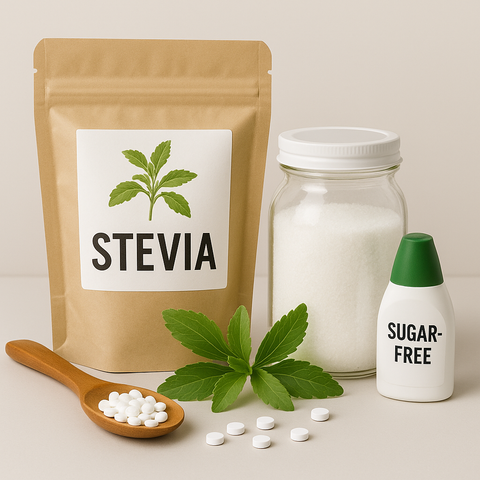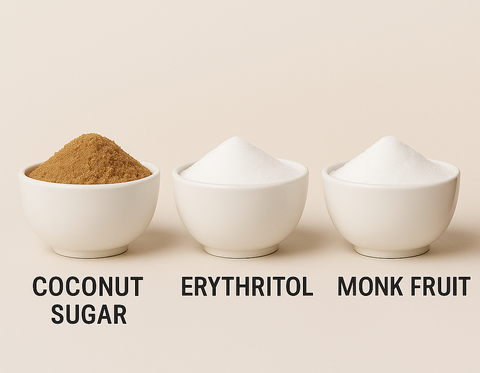These days, it’s easy to find products labeled “sugar-free,” “zero-calorie,” or “naturally sweetened” — especially if you’re paying attention to your health or watching your sugar intake.
But behind those labels, there’s one question we all end up asking:
Is stevia really good for you?
And how does it compare to other sugar substitutes?
Let’s break it down — no hype, just honest answers.
What Is Stevia?
Stevia is a plant-based sweetener extracted from the Stevia rebaudiana plant. On the surface, it sounds great:
✅ Zero calories
✅ Doesn’t raise blood sugar
✅ Derived from a plant
But here’s what most people don’t realize:
By the time stevia reaches your coffee, yogurt, or protein bar, it’s often highly processed and combined with other ingredients like erythritol, dextrose, or flavor modifiers to reduce bitterness and improve shelf life.
So while it’s marketed as “natural,” the final product is often far from simple.
Stevia vs. Other Sugar Alternatives
Here’s how stevia stacks up against other common options:
| Sweetener | Calories | Source | Pros | Cons |
|---|---|---|---|---|
| Stevia | 0 | Plant (processed) | Doesn’t raise blood sugar, zero cal | Bitter aftertaste, often blended |
| Erythritol | 0.2 | Sugar alcohol | Tooth-friendly, no blood sugar spike | Can cause bloating |
| Monk Fruit | 0 | Fruit (processed) | Natural origin, antioxidant content | Expensive, often mixed |
| Aspartame | 0 | Synthetic | Intense sweetness, long shelf life | Controversial, taste issues |
| Cane Sugar | ~16/tsp | Plant (minimally processed) | Familiar taste, real food | Adds calories, affects blood sugar |
What About “Sugar-Free” Labels?
“Sugar-free” doesn’t always mean healthy. It usually just means sucrose (table sugar) isn’t present — but it might be replaced with highly processed or artificial sweeteners.
And while those might reduce calories, they can still affect your digestion, taste preferences, and overall health depending on the blend.
More consumers today are shifting from “sugar-free” to clean, simple ingredients — even if it means using a little real sugar in moderation.
So… What’s the Best Choice?
It depends on your values and your body.
-
If you're avoiding blood sugar spikes, stevia or monk fruit might help — but check the labels for hidden additives.
-
If you want something more natural and minimally processed, small amounts of cane sugar or maple syrup might be a better fit.
-
If your digestion is sensitive, be cautious with erythritol or other sugar alcohols.
The real key is knowing what you’re eating — and why.
Final Thoughts
There’s no perfect sweetener for everyone. But understanding the difference between “natural,” “processed,” and “artificial” helps you make better choices for your body, your taste buds, and your peace of mind.
Whether you choose stevia, cane sugar, or something else — choose honestly and intentionally.
Want more ingredient transparency and natural goodness in your kitchen?
Explore our collection of syrups made with pure cane sugar (less sugar content then most store bought syrups) and natural extracts giving them real flavor with no chemical aftertaste or side effects.



